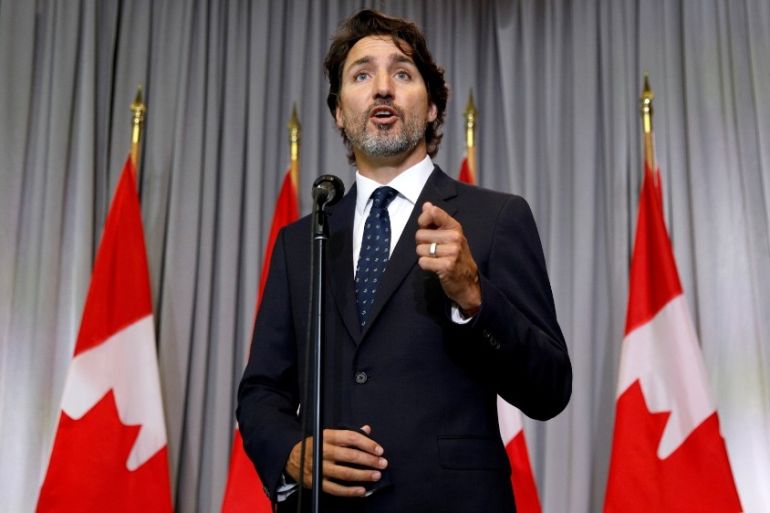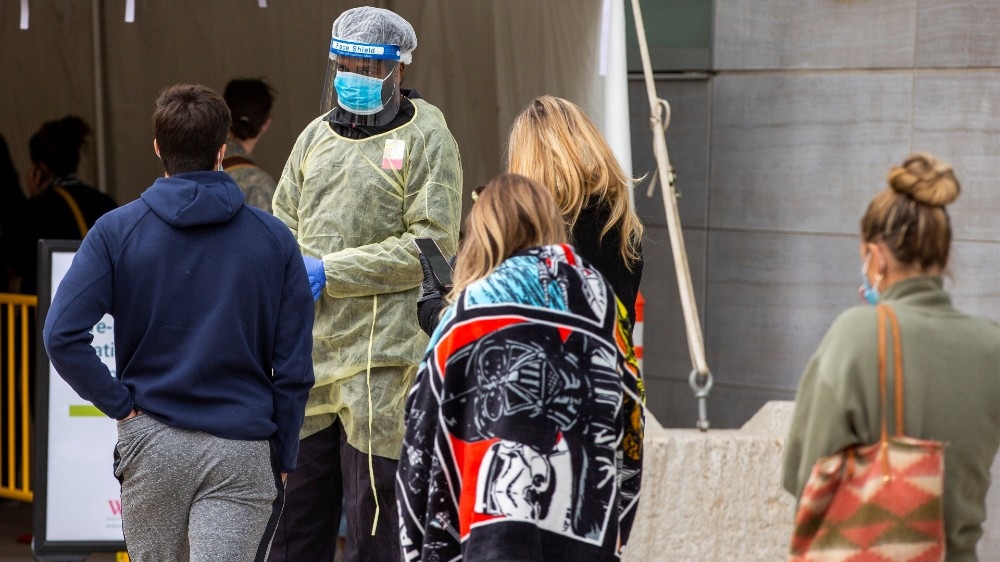Canada’s COVID-19 recovery plan to dominate Trudeau throne speech
Justin Trudeau is set to unveil ‘broad’ plan that includes healthcare and job support when Parliament resumes Wednesday.

Montreal, Canada – With a mounting number of new COVID-19 infections in Canada, the pandemic is expected to be the focus of Canadian Prime Minister Justin Trudeau’s widely anticipated throne speech this week.
The throne speech, which opens every new session of parliament and will be delivered by Canada’s governor general on Wednesday, will set out the government’s priorities for the coming months.
Keep reading
list of 4 itemsMexico’s teachers seek relief from pandemic-era spike in school robberies
‘A bad chapter’: Tracing the origins of Ecuador’s rise in gang violence
Why is the US economy so resilient?
Trudeau is expected to lay out his long-term vision for key social programmes, such as childcare, housing, long-term care homes, and a green economy plan, Canadian media outlets have reported during the past several weeks.
But with the recent uptick in COVID-19 cases and concerns that Canada is entering a second wave of the pandemic, experts say they expect to see the prime minister’s Liberal Party zero in on employment and healthcare, two sectors that have been hard hit by the novel coronavirus.
“Expectations have shifted a bit from what they were a couple of weeks ago,” said Jim Bickerton, a political science professor at St Francis Xavier University in Nova Scotia, on Canada’s east coast.
The speech on Wednesday in Ottawa will be “a bit more scaled back” than the government may have originally intended, Bickerton told Al Jazeera in a phone interview, “with closer attention to the need to continue focusing on limiting the negative health and economic impacts of COVID”.

Trudeau’s minority government has been under pressure to help provinces shoulder the economic burden of the pandemic and the strain COVID-19 has placed on their respective healthcare systems, which are controlled at the provincial level.
As of September 18, Canada had reported more than 141,000 cases of COVID-19 since the pandemic began and 9,205 deaths attributed to the novel coronavirus – and the country’s two most populous provinces, Quebec and Ontario, have borne a large number of those recent cases.
“We’re in desperate need of your support,” Ontario Premier Doug Ford said during a news conference that same day, alongside three other provincial premiers. The premiers have asked the federal government for an additional $21bn ($28bn Canadian) to cover high healthcare costs associated with the pandemic.
Confidence vote
This week’s throne speech will trigger a confidence vote in Parliament, so Trudeau will need the support of at least one opposition party to avoid forcing a federal election, explained Daniel Beland, director of the McGill Institute for the Study of Canada at McGill University in Montreal.
The federal Liberal Party won 157 seats in the last vote in October 2019 to form a minority government, edging out the Conservatives, who won 121 seats.
“It’s a strong minority government in the sense that you basically need the three main opposition parties to band together in order to pull the plug on that government,” Beland told Al Jazeera in a phone interview.
Last week, Trudeau said he planned to speak to all the opposition leaders, two of whom – the Bloc Quebecois’ Yves-Francois Blanchet and new Conservative Party of Canada leader Erin O’Toole – recently tested positive for COVID-19.
New Democratic Party leader Jagmeet Singh this month voiced scepticism about whether the Trudeau government would follow through on any promises made during the throne speech.
On upcoming throne speech, Jagmeet Singh says he won't be surprised if it contains items NDP & Cdns want like universal pharmacare but he is worried it will be "empty words" and no follow- through from govt. The NDP leader says he has call planned this week with the PM #cdnpoli pic.twitter.com/KneL47PtkZ
— CPAC (@CPAC_TV) September 15, 2020
“I won’t be surprised if the prime minister says some of the right things, says some of the things that Canadians want to hear, some of the things that we want to hear,” Singh told reporters on September 15.
“But what I am worried about is that they’ll just be empty words.”
‘Risky proposition’
The throne speech comes after Trudeau prorogued Parliament last month in the middle of a scandal about the allocation of a government contract to WE Charity, an organisation that had paid members of Trudeau’s family for past speaking engagements.
The contract was eventually cancelled amid widespread criticism and questions about the appearance of a conflict of interest, and WE Charity later said it was closing its operations in Canada. Finance Minister Bill Morneau, whose family also has ties to the charity, also resigned last month at the height of the scandal.
”I
or even if people think that we are heading in that direction. I think it would be a risky proposition.”]
Despite that, Beland said no Canadian political party wants to be responsible for forcing people into an election in the middle of a global pandemic – and he expects at least one opposition party will provide Trudeau with the votes he needs to survive a confidence vote.
“I don’t think that politicians want to trigger an election if there’s a second wave [of COVID-19] or even if people think that we are heading in that direction. I think it would be a risky proposition,” he said.
Beland said the throne speech – a “broad, vague speech” by design – will give Canadians an opportunity to understand where opposition parties stand and which party or parties are willing to prop up the government.
It will also demonstrate what the Liberals’ agenda is – and how they plan to tackle the COVID-19 crisis in the long term, he said.
“It’s likely to put forward relatively big ideas about how to move beyond this [COVID-19] crisis – but not just with temporary measures but also through permanent fixes to solve the problems that were revealed or exacerbated by the crisis.”